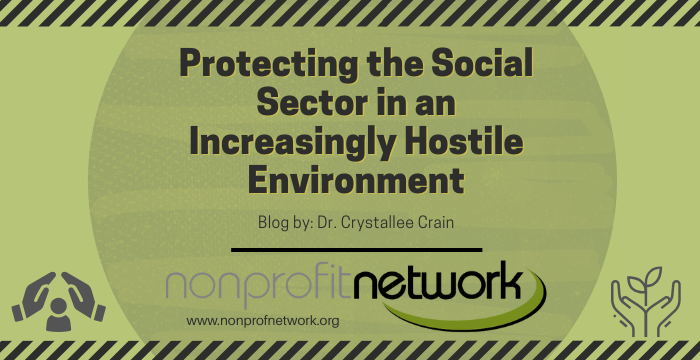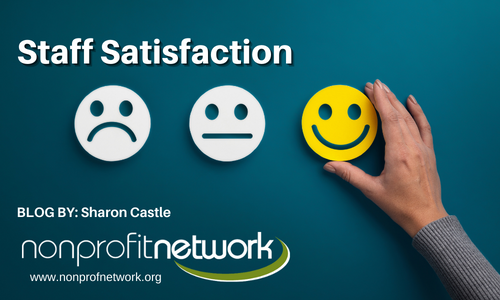From Reagan to Trump: How Federal Tax Policy Shapes Philanthropy and Community Power
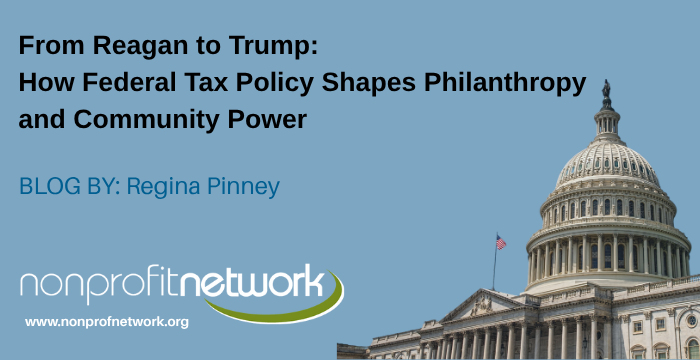

Regina Pinney
Executive Director
From Reagan to Trump: How Federal Tax Policy Shapes Philanthropy and Community Power
In the early 1980s, President Ronald Reagan ushered in a new era of federal policy marked by deep tax cuts, sweeping deregulation, and a rhetorical commitment to shrinking the role of the federal government. His administration’s economic philosophy, often called “trickle-down economics,” rested on the belief that the private sector—including charitable organizations—could address social problems more effectively than centralized government programs.
Critics rightly pointed out that many of Reagan’s policies disproportionately harmed low-income and marginalized communities. Yet one enduring impact that often goes overlooked is how his administration’s tax reforms incentivized private philanthropy. By lowering income tax rates while retaining or even enhancing the charitable deduction, Reagan encouraged individuals and corporations to give more of their wealth away in service of the public good. The premise was clear: if government would no longer meet community needs at scale, then private giving would need to fill that gap—and tax policy was designed to support that shift.
Read More
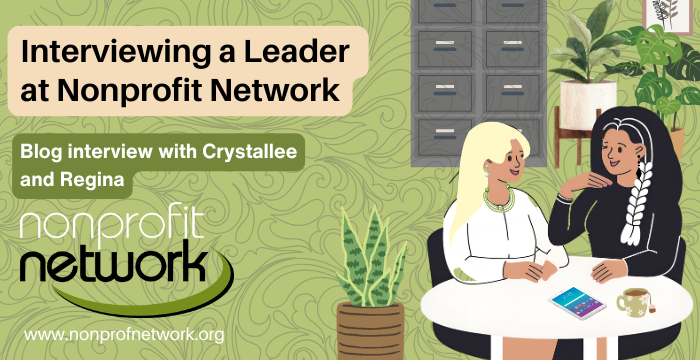
Meet our Visionaries Behind the Mission: Crystallee Crain and Regina Pinney
In this special blog interview we're excited to spotlight two of our changemakers: Dr. Crystallee Crain, Director of Nonprofit Impact Consulting, and Regina Pinney, Executive Director of Nonprofit Network.
Crystallee brings a dynamic blend of strategic insight, social justice advocacy, and deep-rooted community engagement to her work. Regina, a seasoned nonprofit leader that has been a steadfast force in helping mission-driven organizations thrive.
In this blog series interview, Crystallee interviews Regina on how Nonprofit Network empowers leaders to create lasting community change. By providing tailored support and addressing each organization's unique challenges, Nonprofit Network helps nonprofit leaders and teams thrive. This conversation highlights the importance of listening, understanding core issues, and building sustainable strategies for long-term success.
Read More
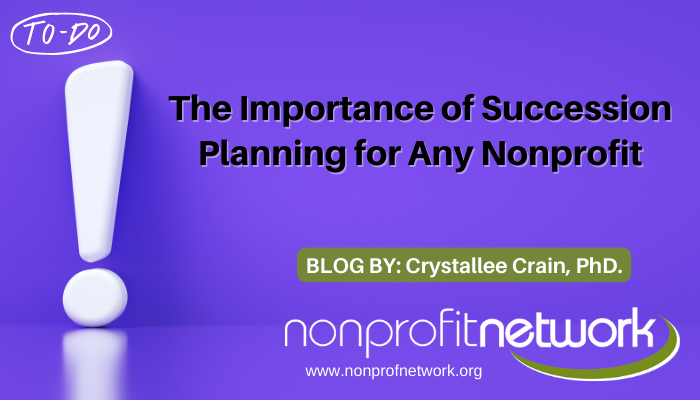

Crystallee Crain, PhD.
Capacity Builder
The Importance of Succession Planning for Any Nonprofit
Succession planning has become a crucial topic for nonprofit organizations as they navigate the challenges of today's ever-changing landscape. With many baby-boom generation leaders retiring or leaving the workforce during the pandemic, nonprofits are facing a critical need to prepare for the future. However, a recent study found that only 27% of nonprofit leaders have a succession plan in place for their leadership positions (Plante Moran's 2023 Nonprofit Summit).
In addition to the challenges posed by an aging workforce, nonprofits must also consider competition in the job market and budget constraints that can hinder their ability to hire replacements in a timely manner. This can lead to a loss of institutional knowledge and a gap in leadership that can be detrimental to the organization. The evolving needs for staffing have forced nonprofits to rethink their traditional hiring approach. As they emerge from the pandemic and hiring challenges, many are seeking leaders with different qualities and skill sets.
Read More
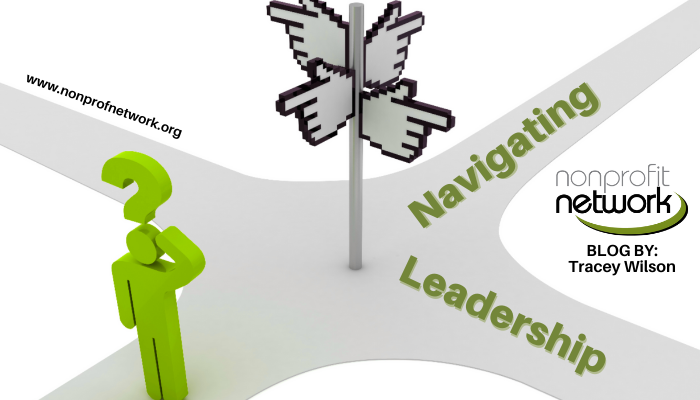
Read More
Upgrade Your Toolbox
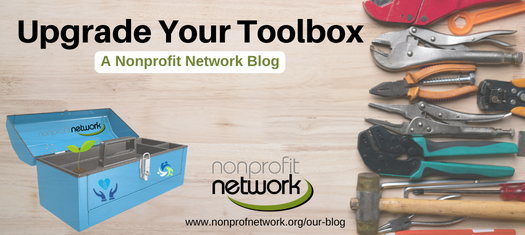
We're always having conversations with leaders about self-care. But today, we're specifically thinking about professional development. When we contemplate professional development, we immediately think about the goal of your mission and what you hope to achieve. But before the work starts, we need to prepare, and choose the right tools for the task. Invest time to equip yourself for success.
Time and the right tools are a resounding endorsement of professional development. Which leads us to two questions:
1) Why do we jump straight into the work?
Read More
They Why Behind Peer Coaching
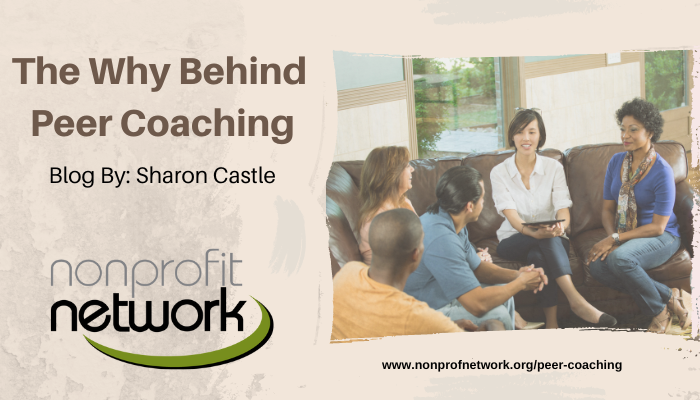

Sharon Castle
Capacity Builder
“This has been the single most impactful Professional Development I have ever been a part of. This process of utilizing empowering questions to guide coaching, along with reiterating thoughts, and not going straight to advice- this has all been a game changer for me and how I communicate.”
“Peer coaching is BY FAR one of the best continuing education courses I've ever taken. I use the skills in my personal and professional life, and they have gotten me unstuck from many challenging conversations and relationships.” ~ Peer Coaching Cohort Participants – March 2023
Read More


Katena Cain, PhD.
Nonprofit Management Consultant
A great nonprofit leader drives the mission down through the organization, upward through the board, and outward through the community. They are also the organization’s chief storyteller, brand advocate, brand guardian, crisis spokesperson, chief marketing officer, and chief fundraiser. To be effective in many of these roles, they must be authentic and be able to connect, collaborate, persuade, mediate, and negotiate with the best.
A great leader is also the ambassador for the health of the organization, both structurally and financially. This means they are responsible for building and maintaining relationships that enable the organization to flourish. They must recruit and retain the talent and supply the tools necessary to develop a strong infrastructure and a culture that builds morale.
A great leader is "tapped-in" to her board, staff, and the people they serve. They are in tune with the social and economic conditions that affect the organization’s mission.
Read More
Staff Satisfaction
 Sharon Castle
Sharon Castle
Capacity Builder
Much has been written about the Great Resignation of 2022 or, as McKinsey & Company recently described it as, “the Great Attrition has become the Great Negotiation.”
In fact, according to McKinsey, 40% of employees globally are planning to leave their jobs in the next three to six months. The Great Attrition is making hiring harder. Are you searching the right talent pools?
So, what does that mean for the nonprofit sector; a sector historically known for paying low wages for demanding positions? At Nonprofit Network, we’ve been getting many questions from stressed-out Executive Directors trying to figure out how to hire and then retain talented staff.


